Creature prison: The VR designs of Rick and Morty's co-creator
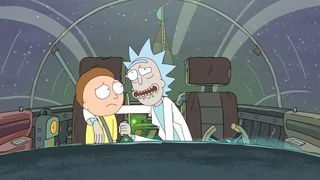
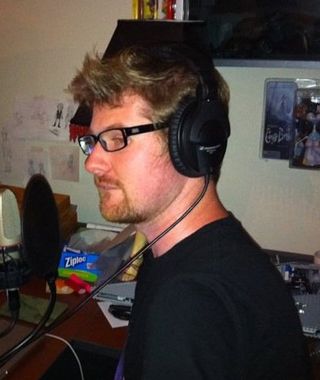
Justin Roiland is a cartoonist, actor, writer, producer, and director. He’s best known for co-creating Rick and Morty, which airs Sundays on Adult Swim, and for voicing both of the titular characters. Roiland is also the voice of Oscar on Disney Channel show Fish Hooks and Earl of Lemongrab on Cartoon Network’s Adventure Time.
Justin Roiland is more passionate about designing virtual reality games than anything he’s ever done, and this is from the co-creator of hit Adult Swim show Rick and Morty. He sounds desperate to make VR games, and he’s already started, filling three spiral-bound notebooks with ideas—story arcs, level designs, UI sketches—and talking to developers who can help.
When I first emailed Roiland, it was because I saw him tweeting about making stuff for the HTC Vive, and I thought it might be a new hobby, or something being kicked around by Adult Swim for Rick and Morty-themed VR games. It’s actually an independent pursuit, and an exceedingly serious one, by his account.
“I have never—and I don’t say this lightly—been more energized, enthusiastic, excited, and motivated about anything in my entire life,” Roiland tells me over the phone. “And that includes my TV show stuff.”
To use his words: that’s saying something. Roiland loves Rick and Morty, and says so emphatically, and he’s also working on a new show pitch for Fox. But a week after my email, he has me on speakerphone—his cellphone nestled somewhere in the rental car he’s returning—and he's hardly talking about TV. He's convincing me that virtual reality is the future, speaking in giant paragraphs in the tone of your favorite teacher, as if he's explained all this before but still effuses enthusiasm for the subject. He pauses only to curse a turn he misses in the rental car.
“Nothing compares to my excitement for this new medium,” says Roiland. “And I want in, and I want to create experiences I can play, and I want to play experiences other people create, and I want to transport people to other worlds. And this is something that I am taking very, very, seriously and I’m overwhelmingly passionate about.”
A fateful announcer pack
Roiland’s first HTC Vive experience was the product of good timing. The Dota 2 Rick and Morty announcer pack revealed a mutual admiration between him and Valve. "Lots of the Valve folks really love Rick and Morty," says Roiland, adding that he and his Rick and Morty collaborator Dan Harmon are both "massive Valve fans." Roiland made plans to visit Valve's office, and a week later Valve announced the HTC Vive, in time for him to try it during his trip.
“Oh my God, OK, VR is here. It’s real. This is what everyone’s been waiting for. This is going to change the planet,” says Roiland, describing his first HTC Vive experience. “That is not hyperbole. That is my deep belief that the way the HTC Vive is designed, the way that it works, it is everything you need to create the most incredible virtual reality experiences that are 100 percent immersive and just absolutely game-changingly incredible.”
PC Gamer Newsletter
Sign up to get the best content of the week, and great gaming deals, as picked by the editors.
Roiland was also one of the first Oculus Rift backers, and one of the first to receive the second developer’s kit of the VR headset. He was astonished by both, and appreciates that Oculus founder Palmer Luckey started the modern VR movement. Before trying the Vive, Roiland was actually coming up with ideas for seated Rift experiences, but after walking through a virtual space—the Vive can use wall-mounted sensors to track the user across a small area—he became captivated by the idea.
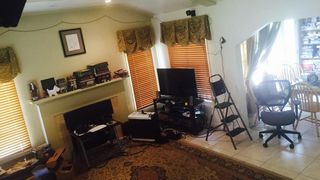
Now Roiland has an HTC Vive dev kit set up in his house, and everyone has to try it. Dan Harmon has tried it. Stoopid Buddy Stoodios, the creators of Robot Chicken, have tried it. He even got his agent to try it. And before he’d shown it off, he was already designing games for it.
“The day I set it up, it was like a brain dump like I’ve never had before of ideas,” says Roiland. “Prior to getting the dev kit I had a couple of ideas, sort of interesting concepts, and then when I got the kit I was like, ‘Oh my god, I was thinking way too big in scope.’ There’s so many amazing, really small, easy yet incredibly fun and addictive experiences that you can create with this technology.”
It only took a week and a half for Roiland to fill those three notebooks with ideas. He now has four “fully fleshed-out games,” with maps and storylines, and even more "little crazy thoughts" beyond those. “Getting that system was the catalyst for me,” says Roiland. “Just going, ‘No, OK, I’m doing this. I am going to do this and I don’t care what it takes.’”
What does a Justin Roiland game look like?
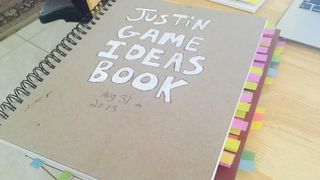
Two of Roiland's notebooks—the tabs represent individual games he's working on.
As for what Roiland is actually making, the best thing we have to look to is Rick and Morty. “I’m never going to be a serious, dramatic—well, never say never—but yeah, I’m definitely focused on really cool experiences with NPC characters that are interesting, that are in my style,” says Roiland. “I’m planning to do voices. I’m planning to cast some people—some of my favorite people from Rick and Morty—as characters.”
“I want to create amazing, beautiful environments to explore,” he adds. “I’m very sci-fi oriented, I love sci-fi. I’m likely going to be focused in that area—colorful, bright alien worlds with really fun, interesting talented voice acted characters, NPCs and whatnot.”
The biggest mistake game designers are going to make when designing VR games, says Roiland, is trying to stuff old game design ideas into a new medium. VR presents problems that are entirely its own. He’s been thinking about how to deal with the HTC Vive’s small walking space, for instance, and says he has 10 ideas already. “It’s just being imaginative,” says Roiland. “Work it out on paper, test it and see what works, in really rough, almost sketchbook form in Unity.”
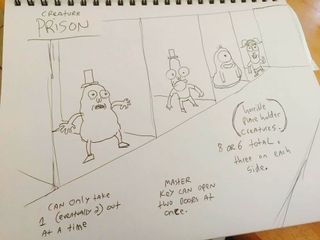
Roiland has also been contemplating how to deal with our natural desire to talk to NPCs, which he says people always do when he shows them Valve’s Aperture demo. He wonders if a Mass Effect-style dialogue wheel would work in VR, or if in the future voice recognition will come into play. “But then you’re looking at Siri type shit," he says, "which is never really that great, or at least it hasn’t been that great.”
For now, Roiland says that good VR game design will use what’s available, embracing the medium’s limitations. The NPCs he’s designing, for instance, talk at the player, not giving them a chance to speak back. “Yeah, yeah, yeah, yeah, da, da, da, whatever, I don’t care about what you’re saying, just listen to me, I’m more important than you are,” he says, mimicking a character.
Partners and obligations
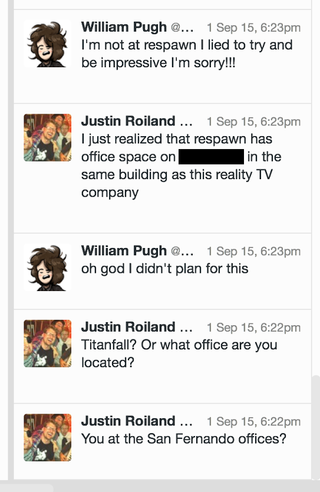
William Pugh sent me a screenshot of the first Twitter DMs between him and Roiland. He initially told Roiland he worked at Respawn, but quickly had to backpedal.
Though he won’t talk about too many design specifics, Roiland is happy to share who he wants to work with. He’s new to making games, so he’s looking for experienced partners. Lately, he’s been talking to StressLevelZero, a developer currently working on VR game Hover Junkers, and William Pugh, one of the creators of the standalone version of The Stanley Parable.
StressLevelZero co-owner Alexander Knoll tells me that, after the studio completes Hover Junkers, its next game will likely be the one it makes with Roiland. "We've been talking with Justin for a while now about creating a VR game and will iron out some details in the coming weeks," writes Knoll.
Roiland admits that the relationships might be slightly lopsided. “I have a lot of shit on my plate,” he says. “I’m going to have to really focus and make sure that the people I team up with are OK with, you know, handling a lot of the stuff I don’t know about, which is engineering, programming … I’m more the creative director, I guess you could say, or the flavor of the game.”
“Justin is like a beautiful but naughty child who needs to be taught what is what and what life is,” Pugh tells me in an email. “And I'm the parental figure he so desperately craves.”
The UK-based level designer says he’s been talking about ideas with Roiland over Skype. “I would like to emphasise how tight me and Justin are,” writes Pugh. “He laughs at all of my Rick and Morty jokes and when he does the voices for me I clap my hands and laugh. This working relationship is solid and professional and completely legally enshrined.”
Pugh jokes about Roiland being his ticket into mainstream pop culture, threatening anyone who would steal it away, but says, I think in some seriousness, “I'm obviously working on other things in combination with this, but I'm sure we'll put together something magical and amazing that will prove a useful stepping stone to getting a TV show of my own one day.”
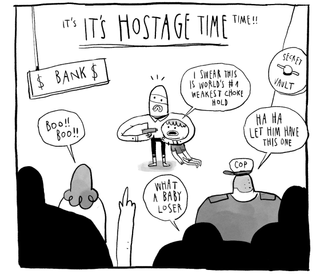
Roiland himself isn’t as facetious as Pugh. He may be one of the creators of a character named Mr. Poopy Butthole, but he’s sincere and persuasive. He isn’t joking. He's also new to video games, though, and I wonder if these partnerships will be enough for him to realize his ideas the way he envisions them. Making games, as we've learned in this era of open development, is hard as hell.
To Roiland's credit, he's already built himself a popular TV show and successful voice acting career, and there's nothing to say he can't add 'game designer' to his resume with the same energy that went into those accomplishments. It may just come down to finding the time.
“With the TV show and Rick & Morty obviously, we’ve got a third season pickup and there’s other very big obligations that I have in my life,” says Roiland. “But this is going to be my passion project, and I will be spending as much as my free time on it as I possibly can.”
I will be spending as much as my free time on [VR] as I possibly can.
At the end of our interview, Roiland is returning his rental car—still talking as I think I hear the door opening—and telling me how excited he is to get back to LA and make plans. His next step is to confirm one or more partnerships and get to work turning his notebooks into virtual worlds. “The beautiful thing is I have the Vive at my house, so I can get a build, I can load it up, and I can playtest it and I can be as involved as I need to be without even living in the same country,” says Roiland. “It’s pretty freaking incredible.”
Pugh, on the other hand, has bigger plans, with more of a Hunter S. Thompson angle. “Me and my crack team are looking forward to flying out to LA and partying it up and doing cocaine with him and his millionaire friends while making some crazy VR things,” he writes. “We will all be dead inside a year.”
Pugh later confirmed that isn't actually planning a trip to LA, but the Skype calls are real—which is the same way Pugh worked with US-based Davey Wreden on The Stanley Parable—as are Roiland's talks with StressLevelZero. It’s exciting that virtual reality is inviting different types of creators into games and inspiring such passion. There are weird, wonderful virtual worlds ahead, and who knows who will design them?
After this article was published, Roiland wrote to add that he and Pugh are planning an HTC Vive VR game jam to happen during the week prior to GDC 2016. They've only started officially planning it today, but have "the best of intentions to follow through." You can follow them on Twitter—@JustinRoiland and @HonestWilliam—for updates.

Tyler grew up in Silicon Valley during the '80s and '90s, playing games like Zork and Arkanoid on early PCs. He was later captivated by Myst, SimCity, Civilization, Command & Conquer, all the shooters they call "boomer shooters" now, and PS1 classic Bushido Blade (that's right: he had Bleem!). Tyler joined PC Gamer in 2011, and today he's focused on the site's news coverage. His hobbies include amateur boxing and adding to his 1,200-plus hours in Rocket League.
Most Popular



